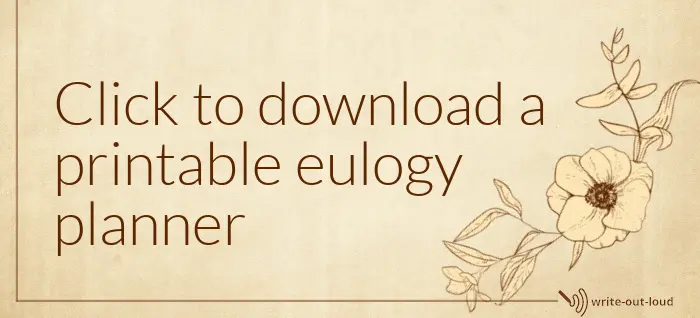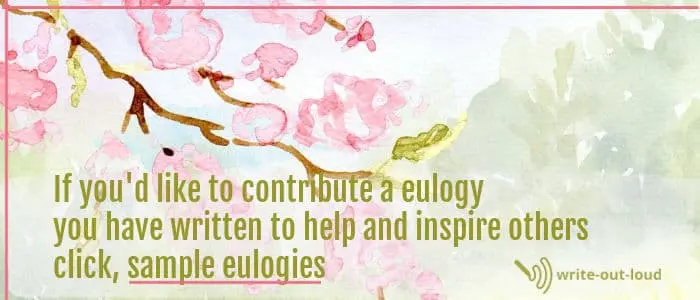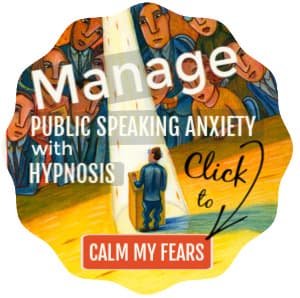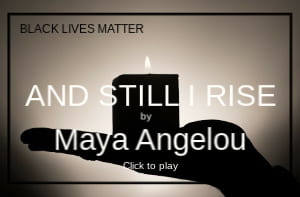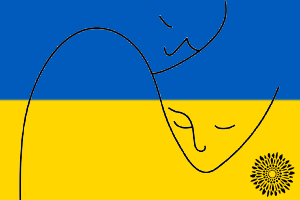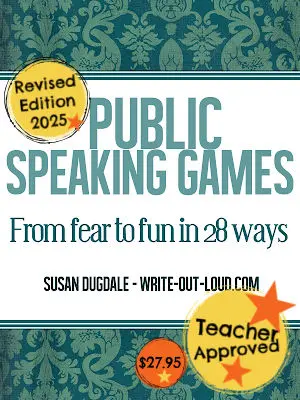- HOME ›
- Sample eulogies ›
- Eulogy for a coworker
Eulogy for a coworker: a heartfelt tribute
What to say, how to structure it, and how to speak with honesty, warmth, and grace.
Contributed by: James T Lang | Virginia, USA
Have you been asked to write a eulogy for a coworker?
Here's an example celebrating and genuinely capturing a deeply valued friendship established over years of working side-by-side. Through its writer's stories we learn about his much respected and loved colleague Donna: "her strengths, joys, challenges, and achievements."
James shared his eulogy for publication knowing there would be others wanting to speak at funeral services for people who were important in their professional or working lives. If you're preparing a eulogy to honor a special colleague, it's our hope you find it useful as a springboard to help you begin.
Table of contents
- Eulogy for Donna
- What makes this eulogy for a colleague special? (An analysis of its 3 key features)
- A 3-part guide to help you write your own eulogy for a colleague (A structured template, writing prompts & how to write oral language)
- Download a printable eulogy planner, with an easily followed template
- More resources for funeral speeches: example eulogies, poems and readings to use
Eulogy for my co-worker Donna
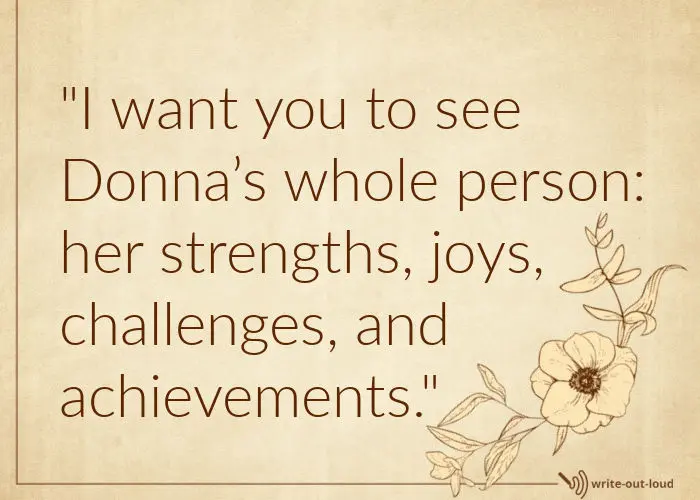
I want to offer you a reflection — a chance to imagine what Donna’s life was truly like. I want you to see her whole person: her strengths, joys, challenges, and achievements.
Donna’s sister, Joy, asked me to share a few words about my years working with Donna at the legal firm Pender & Coward (P&C).
I’m an attorney, and Donna was, for many years, a paralegal in our family law section. She worked with my partner, Bart.
P&C is a large firm: 35 attorneys, 100 employees, spread across three offices. I might have barely known Donna — except that from 2005 to 2008, Donna and Bart were there for me during my own divorce.
Donna left the firm in 2007, but she returned in the spring of 2012, and this time, she worked directly with me and Jack. We were together every day — hand in glove.
Donna left 2007, returned 2012 & became ill 2014
Donna left the firm in 2007, but she returned in the spring of 2012, and this time, she worked directly with me and Jack. We were together every day — hand in glove.
In 2014, Donna began getting sick. That’s when I started visiting her at home — at her condo in Cypress Point. Then I saw her in the hospital at Virginia Beach General, then at the Kempsville Health and Rehab Center in Chesapeake. Finally, during her time in hospice, I visited her often at the home of Linda and Sherrise in Thoroughgood.
Donna & the tug hits the bridge case
Let me tell you about the kind of person Donna was — by telling you about the tugboat case.
When she returned to the firm in 2012, I was deep in a tough federal case — we were suing a tug company after a tug hit a bridge. The damage cost over a million dollars. Their insurance company didn’t want to pay, even though their operator fell asleep at the wheel. And it didn’t help that the agency I was representing waited three years before giving me the case.
Donna stepped into this mess — after decades doing family law, not federal admiralty cases. And what did she do?
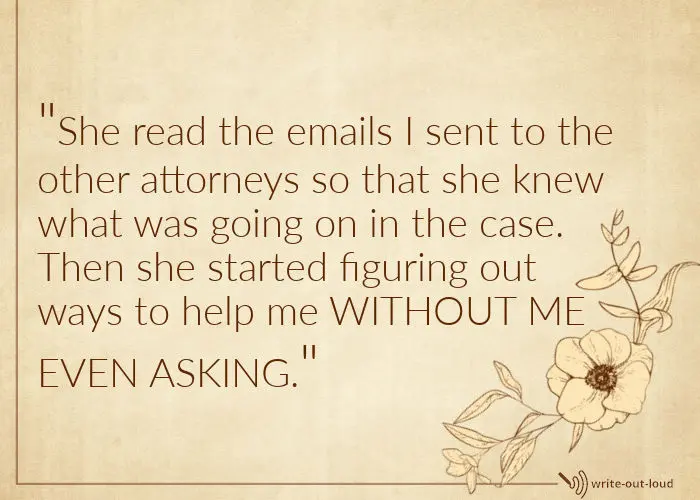
She read every email I sent to the other attorneys. She learned the case inside and out. Then, she started offering help — before I even asked for it. Calm under pressure. Always organized. She kept meetings on track, wrangled expert witnesses, and helped us win a $1.25 million recovery for our client.
And that was just the beginning.
Donna and the sneeze
But let’s pause here for a classic Donna moment: the sneeze.
Anyone who’s lived in Hampton Roads knows jet noise. You stop talking. You wait for it to pass. There’s no talking over it.
Same with Donna’s sneeze.
It wasn’t just “achoo.” It was a full-body event. A cross between a growl, a yell, and a foghorn.
Once, when she worked with Bart on the fifth floor, her sneeze made it onto a dictation tape — from a completely different office down the hall! Another colleague, Peggy, once said, “Girl, I’m waiting to see tonsils flying out of your cubicle and hitting the wall.”
Donna shot back: “That’s never gonna happen. I had my tonsils taken out when I was a little girl.”
And according to Donna, if you didn’t fully release a sneeze, you’d burst a blood vessel in your eye.
Donna: strong, determined and stubborn
That was Donna. Strong. Determined. Maybe even a little stubborn.
Between 2007 and 2012, while she was working at another firm, Donna overcame breast cancer. Surgery, radiation, chemo. She missed one day of work.
That’s how I knew something was wrong in 2014, when she began missing work. I started asking — gently at first — if she’d seen a doctor.
She’d say, "No. I’m using affirmations. I am healthy, whole, and free."
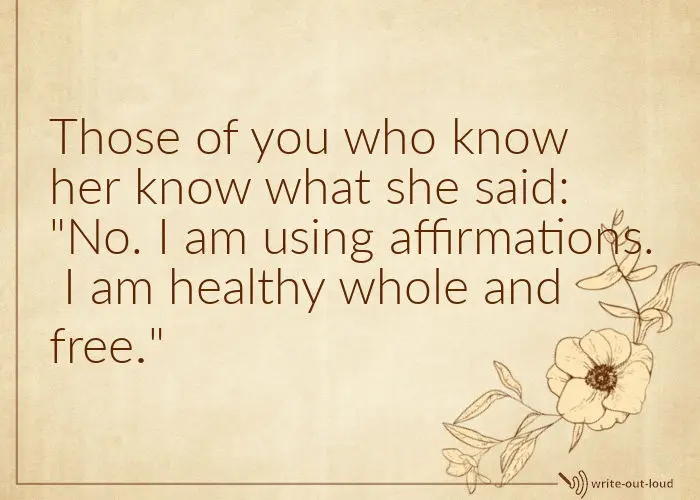
Even when our colleague, a paramedic with the Virginia Beach Rescue Squad, urged her to go — she’d say the same thing.
How many of you heard her say that?
Eventually, she became too sick to work. I wasn’t there the day she was taken from the office in an ambulance. That was her last day at P&C. She had been counting down the days to a trip to Ireland with Bonnie. She never got to take it.
How people rallied around Donna
But let me tell you what Donna did get: love.
Her sisters — especially Joy. Her daughter, Heather. Her work family: Diane, Teresa, Valerie, Peggy, Jack. Her extended family — Bonnie. And most of all, Linda and Sherrise, who opened their home and their hearts during Donna’s hospice.
What you gave Donna was extraordinary. You showed us what true compassion looks like.
A few final snapshots
Now, a few final snapshots:
Her machine-gun, rat-a-tat-tat speech. She called it her Southern drawl. I thought it sounded more like Brooklyn.
Her unwavering loyalty. She wouldn’t even go to the restroom if her boss was in a meeting — just in case she was needed.
Her uncanny radar for phonies — and her blunt advice when she didn’t trust someone.
Her kindness. Donna once taught me to thank people while they’re helping you, not after. "Thank you for going the extra mile." I still do that, every day.
Her shopping joy — and the day she came back from a fire drill with 10 pairs of shoes! Then the joy when she got her urge to shop under control.
Her stuffed bear, her cat Zoey, her beautiful artwork. And her humor.
One Friday, she brought me a printout of my weekend calendar — a trip with my wife, Susan, to the coast. On Monday she asked how it went. I said, "Good."
She grinned and said, "Well, at least one of us got some action this weekend."
"Love you much."
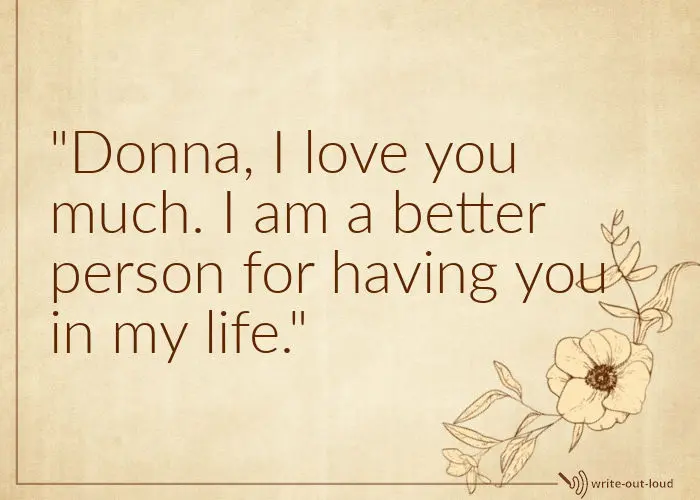
Over the last year and a half of Donna’s life, whenever we parted, she’d say: "Love you much."
Donna, I love you much.
Thank you for everything you did — for all of us. I’m a better person for having known you.
What makes this eulogy for a colleague special?
Thousands of people have read James' eulogy for his colleague Donna since it's been online. The vast majority of them will have never met her while she lived. And yet, through his words, after her death, now they have.
This eulogy resonates because it is strong in three areas.
1. Personal, specific and honest
What James says is personal, specific and honest. We see Donna. We hear her and, feel like we know her. The stories James shares: the tug-boat case, the blast of her sneeze, her insistence on the healing power of affirmations, and her radar for fakes, bring her vividly to life. Through them we understand is Donna strong, stubborn, deeply loyal, funny, and a larger-than-character.
2. Chronological clarity
There’s a clear timeline from James' first meeting with Donna, to working closely together, and from there to her illness. It helps us understand and appreciate the depth of their relationship. It gives it context, a frame.
3. Emotional balance
The eulogy weaves between light, funny moments to the challenges of illness and loss, ending with a simple, powerful close: “Love you much.” It's balanced rather than skewed toward either light or heavy heartedness.
Comments about James's eulogy for his colleague Donna
Deirdre says:
"Thank you, James. Your eulogy for Donna is beautiful: full of love, light and stories. To use her words, we love it much."
Would you like to comment on this eulogy?
If you'd like to add a comment, please let me know what you want to say through the submission form on my about me page. Be sure to tell me it's James's eulogy for his colleague Donna you are commenting on, so I know where to post it. Thank you.

Do you have a eulogy to write for a colleague?
Here's an easily followed three-part guide that will take you through the process.
Part 1. A eulogy structure or framework guide
There are seven sections. Each has a specific purpose. When completed you'll have all the material you need to prepare a meaningful eulogy.
If you're unsure what to put into any of them, scroll back up and see what James has done. Use that as a guide for yourself.
For instance: To cover what is needed in the first section, Opening & Purpose, James has written:
"I want to offer you a reflection — a chance to imagine what Donna’s life was truly like. I want you to see her whole person: her strengths, joys, challenges, and achievements.
Donna’s sister, Joy, asked me to share a few words about my years working with Donna at the legal firm Pender & Coward (P&C)."
What he says acknowledges the audience and tells them why he is speaking.
The purpose of second section, Professional Connection, is established with these words:
"I’m an attorney, and Donna was, for many years, a paralegal in our family law section. She worked with my partner, Bart.
P&C is a large firm: 35 attorneys, 100 employees, spread across three offices. I might have barely known Donna — except that from 2005 to 2008, Donna and Bart were there for me during my own divorce."
7-step eulogy structure/framework guide
- Opening
& Purpose
Greet the audience and introduce why you're speaking. - Professional
Connection
Explain how you knew the person and worked with them. -
Core
Qualities
What made them memorable? Stories that show their personality. -
Challenges
& Strength
Speak honestly about difficulties they faced, and how they responded. -
Community
& Support
Acknowledge those who stood by them or cared for them. - Closing
Stories or Snapshots
Short vignettes that round out the portrait (funny, warm, human moments). -
Farewell
& Gratitude
Offer a personal goodbye and express what they meant to you.
Part 2 - Writing prompts to help you begin
Use these prompts to unlock your memories. They'll help you gather stories showing the whole person: their unique qualities, their quirks and foibles, alongside their strengths.
Professional connection:
- What kind of work did you do together?
- What was their attitude toward work and their colleagues?
- Did they go out of their way to support others?
Personality:
- What phrases, habits, or quirks do you associate with them?
- What would others say they were known for?
- Did they have a signature expression or saying?
Humor:
- What made them laugh? What made them unique?
- Is there a moment/story that would bring a smile?
Impact:
- What did you learn from them?
- How did they handle adversity?
- How will you remember them?
Part 3 - Writing oral language
Writing oral language or 'writing for the ear' is very different from writing language for the eye: words intended to be read online or printed on paper in a newspaper, magazine or a book.
To write conversational language, we have to write like we speak. It's easier to do that if we imagine we're talking to someone.
The keys to getting it right are:
- avoiding long complex sentences in favor of shorter ones, and/or phrases. For example: "That was Donna. Strong. Determined. Maybe even a little stubborn."
- using contractions like 'she'd', 'we'd' or 'we're'
- asking rhetorical questions. For instance: "How many of you heard her say that?"
- directly addressing the audience. For example: "Let me tell you...".
- focusing on one clear idea or story at a time. As in the story about the tugboat case.
- making full use of pauses. These give the audience time to take an idea in and respond to it.
- varying the speed of your delivery: going slower for emotion, and faster for humor or excitement.
- closing with something meaningful that the audience can take away with them. For example, the phrase: "Love you much." and,
- saying it out loud and really listening to ourselves as part of the preparation process. Recording yourself will help you hear if you've captured what you intended.

Download a printable eulogy planner
I've taken the guidelines for writing a eulogy for a colleague and put them into a free 10 page printable. It has instructions for gathering material along with a template with fill-in-the-blank slots to enter what you want to say.
Complete it and you'll have a well-structured first draft. Of course, you'll still need to edit, polish and rehearse it, but you'll be well on the way to having a speech you'll feel OK about giving.

More resources for writing funeral speeches
- Read more sample eulogies for family members, (mothers, fathers...) friends, and colleagues. (Like the eulogy you have just read, these too are absolutely genuine i.e., written without Artificial Intelligence (AI) assistance.)
- Find a poem or a quotation you'd like to use: 6 pages of poems and quotations suitable for funeral readings, some with audio and printables.
- and...

About the Author: Susan Dugdale, founder of write-out-loud.com, is a qualified teacher of English and drama with over 40 years of experience. Drawing on her professional expertise and her personal journey from shyness to confidence, Susan creates practical, real-world resources to help people find their voice and speak with power.

